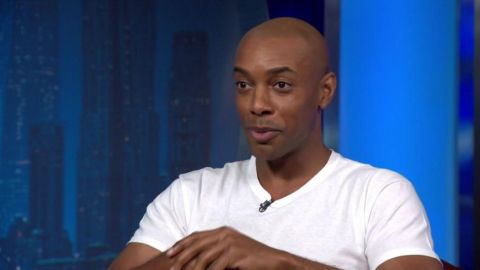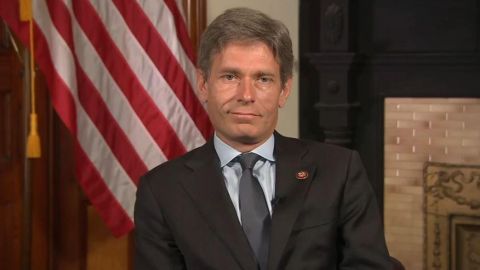Read Transcript EXPAND
CHRISTIANE AMANPOUR: Now, this year commemorates the 400th anniversary of the first documented arrival of African slaves to the American shores. Important to remember as 2020 Democratic hopefuls continue to accuse President Trump of stoking racism. Black American author Casey Gerald reflects on this grim anniversary with an article for “New York Magazine.” It’s called the “Black Art of Escape: A New Vision for Black Americans. A Yale and Harvard graduate who grew up poor in Texas, he says being respectable has little to do with being respected, especially for the black community and he’s been telling our Michelle Martin about the importance of remembering and his hope to go from resistance to renewal.
(BEGIN VIDEO TAPE)
MICHEL MARTIN: Casey Gerald, welcome back to the program. Thank you for joining us once again.
CASEY GERALD, AUTHOR: Thank you for having me.
MARTIN: The 400th anniversary of the arrival of people of African decent in the United States is this year and there are commemorations, particularly in Virginia, but also elsewhere and this occasion has brought up a lot of things for you, to the point where you’ve written a very extensive 8,000 word piece for it for “New York Magazine.” So, I’m going to ask you to tell us like what this brings up for you.
GERALD: My father’s mother was born called in a town called Pelham, Texas, which was one of the first communities founded by freed formerly enslaved Texans. It was first called Twin Forks of the Creek. And she passed last year and she’s been so heavy on and with me, we’d go down every year for the family reunion and she’d make us pick cotton and do all this kind of stuff. And there was a little museum and she’d say, and we’d get so annoyed by, she said, you have to know your history. And long before I even started writing this piece, I knew that I and so many of my friends who are obviously loosing those people in our lives who had direct connection to formerly enslaved people, we had to remember. But I also wanted to go beyond remembering and honoring those people. I wanted to try to figure out where we go from here and that was where the essay was birthed.
MARTIN: One of the things that you say in the piece is that you have a lot of friends who have no interest in remembering. And so, I wondered if I could ask you to read a section of the essay where you acknowledged that, where you talk about that an dhow you talk about how you’ve grappled with that idea.
GERALD: I’d love to. I’ve come across more than a few of us who have no interest in remembering 1619 and marking our 400 years at all. Why, one asks, would we celebrate becoming slaves? We’re not, I told her. We are making the birth of a new race of people, our people and enslaved and all. We take a backward glance at them to enact a future vision for ourselves to learn how to access that gift Miss Fanny Moore’s mother embodies. To stand inside one’s self in another dimension, on another plain that might help us endure if not transcend this plain we cannot fully escape. I do not believe that we are our ancestor’s wildest dreams. I do believe they are our greatest hope.
MARTIN: There are — have been a few public figures in recent years who take great umbrage at the idea that anyone might now welcome their arrival in the United States, no matter how they got here. In fact, some have even gone so far as to say that black people should be grateful for slavery, because it brought them to the United States. So, that’s kind of one point of view. And then there’s the other point of view that you describe here, which is that the sense of — there has been so much pain, so much degradation that why would you acknowledge that. I wanted know how you kind of threaded that needle for yourself, how your started thinking about that?
GERALD: First off is this very strange moment we’re in of sort of reimagining the historical record. You think about “Black Panther” was a great movie. I love Ryan Coogler. But you read Zora Neale Hurston’s “Barracoon” and one thing that Cujo (ph) makes clear, he says everybody’s talking about kings and queens in Africa (inaudible) one king and one queen. I didn’t have — what do you say, I didn’t have the ivory on the door. So I think the reality of this moment, why it’s so important for us to remember is the kind of shame, I think, at the reality of where we’ve been and where we come from. The reality that over 90 percent of Africans who were sold into slavery were sold by other Africans, right. The — the truth of our people is much more complex and I think there’s a sort of resistance to acknowledge in that we’re humans. Just because we’re black doesn’t mean we’re saints, that’s one. The other piece and this goes to that deal that I’m sure you probably heard growing up and I heard growing up, you’ve got to unlearn that slave mentality. You know so many people have said that. And — and I thought I listened to that for a long time and then I thought, I said wow, what a curious thing to unlearn. Think about our people, my grandmother’s grandfather was born a slave. You think about how did these people survive. OK. So the artist Ja’Tovia Gary totally changed my life. She had a video instillation that was a reinterpretation of a deal that Ruby Dee recited in the 60s of the Federal Writer’s Project, went around talking to formally enslaved people. And one of the folks they talked to was Ms. Fannie Moore, this was down in Georgia, and she told the story of her mother who one day on the plantation started getting happy. She was sort of shouting and praising and all this kind of stuff. And the master comes down and he says .
(BEGIN VIDEO)
RUBY DEE, ACTRESS: What’s all this going on out in the field. You think I sent you out here just to hoop and yell. No soiree (ph), I sent you out here to work and you better work or I’ll put this (inaudible) across your black back.
(END VIDEO)
GERALD: And Ms. Fannie Moore’s mother, she stops and she says the Lord is showing me the way. And one day, no matter how you all treat me and my children, we ain’t never going to be slaves no more. And then master starts whipping on Ms. Fannie Moore’s mother.
MARTIN: Because he did not want to hear that.
GERALD: Didn’t want to hear it at all. And .
MARTIN: Didn’t want anybody else to hear that.
GERALD: You see. And you would think that that shut her up and all of the sudden, Ms. Fannie Moore says her mother, this big smile came across her face. And she started shouting I’m free. I’m free. I’m free. So what I’m trying to say in this essay, the black art of escape is that we’ve been given sort of a strategies to make it in this country, to endure this land. And I sort of very simply might say one of those strategies might be the John Henry (ph) strategy. If you work hard enough, you can make it. We know that is simply limited. Another strategy might be the Nat Turner strategy, you know give them hell; kill them all, you know burn it down.
MARTIN: That hasn’t worked.
GERALD: OK. But there is a third, I think, very important tradition that each of us has the right and the opportunity and perhaps at this very urgent moment, the responsibility to reclaim and that’s the strategy of flight, of escape, of Ms. Fannie Moore’s mother who in the face of such brutality of such the logic of despair says I’m free.
MARTIN: Where we going? Where we going? Where we flying to? Where we going?
GERALD: Well, you know, I try to offer some — some — what I call it a buffet of options. Now some people might physically leave, right, but that perhaps is not practicable for everyone. But it’s less about a physical (inaudible) it’s an inner resource. I talk about how so much of our time right now has been focused on resistance. I have no interest in that. What I want us to focus on is renewal. How do we build that inner resource. Some of it might look like what Ms. Fannie Moore’s mother did. Some of it might look like what Lauren Hill did when she went on stage and said she’s renouncing her fame, she’s disappearing. And she said — and everybody said well, she’s mad. She’s crazy. And she said ever sense people thought I was deranged, I’ve had total peace.
MARTIN: One of the reasons that people are always so interested in what you have to say is that so much of your — your story tells what a lot of people think of as the American dream. I mean you’ve raised in precarious circumstance. You know your mom struggled with mental illness; your dad struggled with addiction. You, you know, were raised by your sister and your grandmother. And you know somehow you get to two Ivy League institutions. You start a business (inaudible) non profit and so forth, and yet as some point you stepped back, you stepped back and said, we need to rethink this, we need to revisit all of this and I think a lot of people are still kind of confused by you, right, and your story and what it is that you’re really telling us. So, why don’t you tell us what you want to tell us, not just about yourself, but also about how you think we should think about this 400 years of history.
GERALD: Yes, absolutely. Well, first off we should think about the 400 years of history by thinking about it. I remember that great story Oprah would tell when she called Maya Angelou once, she was weeping, and weeping, and weeping, and weeping about something that happened and Maya says, stop it, stop it now, stop it and say thank you. So, the most important thing each of us as black people in this country have to do this year and every day is stop and say thank you. There was an enormous price that our people have paid to live here, to make it possible for us to live here, and until we say thank you for that and carry them with us as we sit on stage with another black person trying to live free and know the enormous price that so many people have paid on our behalf, that’s the most important thing as it relates to the year 1619 today for me, and then we have to think very seriously, not in a dismissive way, about the strategy of — strategies we’ve employed, but very earnestly about what it is that we’ve learned from those strategies. So, take respectability politics, and I write very critically about respectability politics while also acknowledging that have respectability in me, as you do too Harvard graduate, OK, a masters in theology —
MARTIN: You’re calling me out. Focus (ph) — stop telling my business.
GERALD: We wouldn’t be ere if we had not. You see what I’m saying. So, I’m not trying to dismiss it, but all I’m trying to say, as I write in the piece is, being respectable has very little, if anything, to do with being respected. We have spent too much time investing in this delineation between respectful black people and not respectful people and it hasn’t gotten us anywhere. It’s limited. So, that’s the first piece. The second piece is protest. Now listen, I was on a panel with Casey Lehman (ph) in Los Angeles a few months ago and one thing we said after, we said listen man, we have to be very humble as we talk about this, because nobody in 400 years has figured the exact way to be free. So, all we’re doing is shining little lights in the darkness saying, hey y’all, this is what I found, this might be useful. Protest is clearly important, the whole linage of the Fannie Lou Hamers and Ella Bics (ph), all of these people have done extraordinary work, but at the same time when I think about my dear friends and the Black Lives Matter Movement, what matters to me is that they are alive. You think about the great U.S. Army Military General George Patton, he said no man every won a war by dying for his country. The point is to make the other poor dumb bastard die for his country. So, I have no interest in another black person dying for America. None. That is not at all to dismiss the extraordinarily important work that my friends and comrades are doing in terms of protests, but it is to say that while we consider that a real option to be part of the resistance, another real option is what I’m advocating, not replacing anything we’ve done, but add into the menu of options, which is renewal, which goes everything from every black person in America ought to be in therapy. You talk about Marianne Williamson’s great $200 and $500 million — billion repartitions package. There ought to be free first-class —
MARTIN: You said a lot of us should go to therapy. Why do you — why do you say that?
GERALD: Well listen, to have lived in this country as a black person is to have ingested a great deal of toxicity, not just your toxicity, your parent’s toxicity, their parents, right, intergenerational trauma. Now we want to talk about, and this goes again to protest, we want to talk about, oh, let’s get the right policies, but those are topical solutions. Healing is from the inside out. Now, that’s not Casey Gerald’s idea, that’s multi-thousand year — those are — people have always said this, so we know that to be true.
MARTIN: What about white people? What do you want them to do, or think, or say, or think about?
GERALD: I find teaching and edifying and prescribing things for white people to be extraordinarily boring and have no interest in it. I’m also a queer person and I feel similarly about a straight person. So this is not just a anti-white thing. It is a sense that folks with power have the responsibility to educate themselves and use their power responsibly. And I have no sympathy for you if you don’t do that.
MARTIN: So your 8,000 word essay for New York Magazine, you’re talking to yourself and other folks can listen if they want or what’s the point of writing if you don’t want to communicate.
GERALD: The point of — the point of writing is to write to black people. I told the editor, I said listen, I — I was going to put this on Tumblr. You OK with it (ph). I didn’t write this to be a published author. I wrote this. Nobody commissioned it. I didn’t care who was paying for it. I wrote it because I wanted to talk to my people about something that I have been thinking about for a long time and — and I told them, I said hey, my only goal is to get as many black people to read this thing — if anybody else reads it that’s fine. But I think it was Stanley Crouch who said all you get from the negro is an intensification of the central ethos of the country. Here we are at this moment where folks think there has been pop up shop of white nationalist terrorism that just came out of the blue. The reality is that white nationalist terrorism is the central ethos of the society from the time that people first get here; otherwise we don’t have a country. So I think if people take seriously the things that I’m trying to articulate and trying to engage and understand in this piece, whether they’re black or — or not black, I think they’ll get something from it. But I wrote it for black people and my sole intent is to try to bring about that day when to be a black person in this country is to be at peace.
MARTIN: There’s a persistent mythology that people of African descent came here with the ability to fly. And that at some point that people could, particularly the enslaved, could reclaim that ability and fly and disappear. Why was that so important to you to write about that?
GERALD: In part because, you know, I grew up with people in the church and I’ll never forget when we — my grandfather died in 1998 and we went out to Lincoln Memorial Cemetery to put him in the ground. It was an all black cemetery because it used to be you couldn’t bury black and white people together, of course. And — and it was still pretty much an all black cemetery in 1998. And we went out there and — and he was a pastor and the — and our choir showed up. The community first Baptist Missionary, Baptist choir. And they had already lined up around the big hole and they were singing in this very hushed tone some glad morning when this life is over, I’ll fly away. I’ll fly away. So all my life this sort of notion of flight had been in there. And then you get to somebody like Toni Morrison, the “Song of Solomon.” You get somebody like Virginia Hamilton and “The People Could Fly.” You get to this great scene, I think, in — in “Revelations” by Alvin Ailey and Cinnaman (ph) and those three male dancers are dancing. And then the stage clears and that one dancer, he comes and he leaps. There is something about transcendence, about ecstasy, about escape, about the embodied illogical freedom that I think is core to our survival as a people, not just over these 400 years but in the time to come. I did a podcast when my book came out and we titled it “How to Make Free People.” Because I had gone back to Yale and I was talking to a group that I founded when I was there — co-founded — the all black men’s union (ph) and I said, you know, we got really good at making great men, great people. What we’ve got to learn how to do is make free people. And then I thought about it for some months. I thought about it for some months and I realized you don’t make free people; you stand and believe that we are free people. And if everything we do every day starts from that perspective, no matter what the data is telling us, if we move through the world — if I teach my 14-year-old niece to move through the world as if she were a free person and we learn what it takes to do that, that I think is the greatest challenge. And the greatest adventure that black people can take for the next 400 years in this country, which by the way, I’m not sure the country will exist for another 400 years. But however long we’re going to be here, I think that ought to be our goal.
MARTIN: Casey Gerald, thank you for talking to us.
GERALD: Thank you.
About This Episode EXPAND
Christiane Amanpour speaks to Joshua Wong about growing tensions between Chinese officials and protesters in Hong Kong. Tom Malinowski joins the program to reflect on unrest in Hong Kong, Kashmir and Moscow. McKay Coppins discusses conspiracy theorists’ reactions to Jeffrey Epstein’s death. Casey Gerald sits down with Michel Martin to talk about his article, “The Black Art of Escape.”
LEARN MORE



